- Home
- M. K. Hume
The Emperor's Blood (e-novella) Page 2
The Emperor's Blood (e-novella) Read online
Page 2
‘Are you saying that Gratian’s Roman guard will accept our assassination of the emperor as the natural way of things and let us live if we catch Gratian and take his life?’ Conanus’s voice was low-pitched and soft, but Andragathius realised that there was wonder and confusion in the low, accented tones.
‘The men who protect the emperor are members of the Praetorian Guard. These fanatical soldiers have killed more emperors than any other men in the Roman Empire. If they’ve been treated like servants or slaves, as Gratian’s Praetorians have been, their resentment will colour their thinking so they’ll be unlikely to intervene when Gratian is put in his place.’
‘I’m surprised!’ Conanus replied. ‘So you expect that Gratian’s personal guard will stand by and watch, once he comes under concerted attack.’
‘Just so, Conanus! It’s regrettable, but Roman soldiers have seen dozens of emperors come and go and the men in the field cannot care less. If you examine the scrolls that recount Roman history, you will find periods of time when aristocratic hopefuls have set the Palatine awash with blood while claimants to the throne killed each other to wear the purple for a day, or a week, or a month, only to lose the throne themselves after an assassination by another aspiring hopeful. During those crazed times, an occasional general with above-average ability has sometimes grabbed at the wreath and crowned himself. After years of manipulation, these able politicians have saved the empire from ruin and, somehow, Rome has gone on. Yet even the sacred vultures of legend have managed to serve the politicians who rule the City of the Seven Hills. Eleven sacred vultures are believed to have come to Rome. And eleven centuries have passed since Romulus first built a collection of shacks along the Tiber River. But our system of rule still prevails. Some of our wiser men among the Romans believe that the advent of a twelfth vulture will sweep the empire away and all our striving and blood-letting will have come to nothing. I doubt that I’ll live to see the legions fail, so I obey the dictums of Magnus Maximus.’
‘So you intend to catch Gratian unawares at a time when he believes himself safe from Maximus’s reach?’
Conanus’s eyes flashed momentarily with something that seemed hot and ambitious. Then the Briton closed his revealing eyes and the enshrouding darkness revealed only the outline of his body.
‘Aye! I serve Magnus Maximus until death. I will trust to the honour and common sense of those Praetorians who know the real Gratian that lies under his fine purple cloak. They will follow a man of the legions, like our master, rather than a sycophant who is the plaything of the senate and a puppet of the Pope.’
Conanus’s eyes opened once more, but now Andragathius could read weariness in them.
‘I can understand most of what you say, although the entire Roman culture seems devoid of honour or nobility to a British barbarian like me.’
The sarcasm dripped from Conanus’s tongue as he emphasised the word barbarian.
‘Think what you will, Conanus, but Rome still has a long reach and rules a world that stretches from sunrise to sunset. We learned centuries ago that honour and nobility can’t be eaten, fucked, or even killed. One of the few places where these virtues still exist is in the ranks of the legions, where men can still value the cost of a human life and the old principles of the Republic.’
‘You’ll become a philosopher or a teacher if you aren’t careful, my friend.’ Conanus allowed his head to rest on his soft pillow of sweet grass and yawned hugely. ‘It’s best that I sleep now and dream of Gratian’s body impaled on my sword.’
‘Then pray to all our gods that luck is with us. Good night, friend, and may your rest be peaceful.’
Andragathius lay awake for a long time after Conanus’s breath began to deepen and slow. Finally, after an hour of restlessness, his mind surrendered to the little death and he dreamed of a ruined city of white marble where the broken roofs opened towards a heedless and unpitying sky. On the Altar of Jupiter, and on the Palatine, the last vulture lay dead and broken across the smashed ark of stone.
Then oblivion overtook him until Conanus bade him waken once more.
Another red dawn had arrived.
CHAPTER II
The Boy without a Name
Truly, there are two primal Spirits, twins renowned to be in conflict.
In thought and word, (and) in act they are two: the better and the bad.
Zoroastrian Scriptures
The early morning light had barely illuminated the edges of the hills when the hunters were back on the road. Eating cold rations from their saddlebags as they moved quickly in the dawn, the men were partly refreshed after five hours of rest. But Andragathius remained weary, with eyes gritty from lack of sleep and persistent dreams that had plagued him until the dawn slowly kissed the horizon. Like a drifting mist that cannot be grasped, he could barely remember the horrors as isolated fragments of a dream drifted through his fingers. He cursed Conanus’s curiosity that had drawn the memories out of his blood during the previous evening, and the sleeping recollections of an old man from his childhood who had explained the Roman world to him in all its dirt, cheap glamour and faded glory.
As the sky lightened, he began to chew on a piece of hard bread and masticated the stale crust until it was moist enough to swallow.
‘Bibracte lies ahead. We can obtain fresh rations and catch some word of Gratian once we reach there,’ Andragathius explained to Conanus. ‘We’ve seen neither hide nor hair of his baggage train, so I’ll wager my left ball that Gratian has chosen to remain on the open road. The bastard always travels in style – he’ll want to have his fine meats, wines, pliant women and, most importantly, his war chest, close to hand.’
Conanus examined his superior officer carefully, noting the signs of weariness that were visible on Andragathius’s stoic face.
‘Did you sleep well?’ the Briton asked cautiously.
‘I’ll not sleep well until Gratian is dead,’ Andragathius snapped and flicked his roan’s rump with the ends of the reins. The horse leaped eagerly into a gallop before the commander pulled it back to a fast trot.
Apart from the men, and away from the knowing eyes of Conanus, Andragathius could think. And he could remember.
The estate of General Theodosius Major in Hispania was huge by Roman standards. Wide plains and lands that were ideal for grapes, grain, horse-breeding and fruit trees created a steady flow of gold into Theodosius’s coffers and this wealth ensured that his servants and his slaves were healthy and contented.
Andragathius was the orphaned son of Theodosius Major’s decurion. The boy’s father had been the youngest son of the owner of several residential buildings in the subura of Rome, a coming man of the middle class. But his father had refused to join the family business, so his wife and only child were deserted after the decurion’s death. Andragathius’s mother had died from fever on the way to Theodosius Major’s estate at Pompaelo; the infant would have perished had a priest not found a scrap of vellum among the woman’s personal effects that included clues to the child’s genealogy, written by his father before he died.
The priest, a kindly old man who had never fathered his own children, decided to educate the boy and raise him to adulthood with the assistance of the widow of a long-dead legionnaire who was his housekeeper. The old cleric, Terentius, loved young Andragathius, but he was determined not to instil in the lad any ideas that would give him ambitions above his station. As a result the boy was never mollycoddled with hugs, affection and kindness. But, for all his attempts to keep the boy free from the sins caused by spoiling, Terentius was often guilty of slipping the boy illicit treats or caressing his fine hair when his housekeeper was elsewhere. The boy grew to love Terentius, but he would always be fearful of the widow, Caelia, who treated the little boy like her own personal slave and was envious of her master’s love for the orphan.
Andragathius adored his lessons w
ith Father Terentius because the old man had that magical quality of bringing places and people to life, especially the old histories where Romans had struggled to create order and civilisation out of the wild tribal factions of Italia. The tale of Horatius and his noble stand on the bridge over the Tiber with two friends in order to block the path of the Etruscan invaders in their assault on Rome would always thrill the boy and fill his dreams with a longing to serve in the Roman legions. By the time the widow Caelia changed his pleasant life, Andragathius was already passionate in his desire to become a legionnaire.
He was just seven years old and learning his letters when Widow Caelia accused him of stealing Father Terentius’s standing crucifix. The relic was a man’s hand in height and was constructed from filigree gold set into a base of alabaster. The crucifix was the priest’s most precious possession. Although Andragathius swore he was innocent, a search of the tiny alcove which contained his pallet revealed that the crucifix had been secreted in a basket of his clothes.
Sadly, Andragathius was cast out of Father Terentius’s small cottage with the widow smirking in the background, having re-established her mastery over the priest and his daily life. What threat the boy could have posed to her was a mystery but, in the way of women, she had resented the affection that her priest had lavished on the orphan boy. All that Andragathius possessed fitted into a small cloth bag on his back, along with the much-creased scrap of vellum.
Yet Father Terentius did not entirely desert his protégé. The name of Theodosius Major had been mentioned on the sheet of vellum, so the priest arranged for the boy to be carried to those broad acres that belonged to General Theodosius, where the lad might survive, or otherwise, on the reputation of his dead father.
Life changed dramatically for Andragathius as he made the lonely and terrifying journey into the interior of Hispania to the town of Augustobriga and, from there, to the huge villa and farm on the top of a low hill overlooking the town. The master was not at home, so the steward looked at the woebegone child, who was both hungry and thirsty, and decided that the decision should be delayed until Theodosius Major returned from the border towns of Germania where the legions were protecting the frontier.
‘Put him to work in the piggeries until the master returns,’ the steward snapped and the boy was led away to learn his new trade.
Treated alternately as a small man or a peasant child, Andragathius was given the task of feeding the huge sows with their long, swinging dugs and the squealing piglets which fought each other to reach the buckets of vile-smelling slops that he poured into their feeding troughs. Forced to sleep in straw on the floor of the stables and beaten over the buttocks if he was slow to waken, Andragathius was robbed of even his name, one that the peasant workers found impossible to either pronounce or remember.
‘Who does he think he is with a jaw-breaker of name like that? Perhaps he’s a little emperor who has fallen on hard times? Listen, you! Your name is Pig Boy now, so get that into your thick head. You’re a Pig Boy, and you’re worth less than our oldest and most useless sow.’ Balbus, the farm labourer who was speaking so cruelly, was a ruffian distinguished by a quiff of bright red hair of which he was inordinately proud.
‘Let him be, Balbus, he’s only a runt,’ the other labourer, Livius, sneered loudly, leaving Andragathius to shrink back into the straw so the ugly eyes of Balbus couldn’t see him.
‘Andragathius! Andragathius! There’s a village ahead of us. Is it likely to be anything of importance? Will there be any Roman soldiers in residence?’ Conanus’s voice cut through the cavalry captain’s painful memories, so the small, frightened boy who was hiding in the malodorous straw disappeared as if he had never existed. Andragathius ran his hand across his sweating brow and was surprised to notice that his fingers trembled.
With a mild oath he pulled his roan to a halt and peered into the distance, his eyes narrowed against the afternoon glare. A thin spiral of smoke rose lazily from a workshop somewhere among the dun-coloured buildings of the village spread out before them.
The captain had a quick flick through his memory and knew exactly where they were.
‘No, Conanus. This is a staging post where horses are changed by couriers and caravans that carry trade goods from Iuliobona and Lutetia. The merchants move the goods into the interior, especially to major cities such as Lugdunum, and they often collect agricultural products that are taken back to the trading ports of Massilia or Iuliobona on the return journey. We’re certain to hear some word of Gratian’s movements once we enter the village.’
Conanus nodded and passed the word to the twenty men who followed that they could soon expect to stand down, water the horses and rest.
From a distance, the cluster of huts seemed clean and well ordered. When the troop made its way into the village and the horsemen were close to the centre, they were able to appreciate that the settlement featured a range of commercial and business enterprises, despite its closeness to Bibracte, which itself was a town of note.
The legionnaires were surprised to see a fully equipped blacksmith’s shop, while its immediate neighbour sold a wide variety of breads and pastries. Other stores sold foods and farm produce, so the local population appeared to be well served by the village’s businessmen. The solitary inn, called the Golden Cockerel, seemed clean and would have been well patronised by travellers and villagers alike during normal times. Closer inspection revealed that the blacksmith’s shop also sold a wide array of household utensils, including metal pannikins, plates, cooking pots, kettles and tin containers designed for agricultural use. Another modest shopfront was devoted to local pottery, coarse and roughly decorated stoneware that looked very suitable for peasant tastes. Of equal importance, the stables would normally have provided a major service to travellers passing through. While small, the village had the facilities essential to a rural community.
Andragathius immediately noticed some small oddities in the signs of industry that had impressed the column when they first arrived. He could see manifest signs of poverty and hunger in what should be an affluent community. The vegetable gardens were bare, no chicks squabbled inside the empty coops beside the ramshackle huts that housed the owners of these small enterprises, and no livestock cropped the grass in the roughly fenced paddocks. Tellingly, the village smith glared at the newcomers with unfriendly eyes, before spitting into the forge in an obvious expression of contempt for his visitors.
Andragathius drew the column to a halt and sent Conanus to purchase food from the baker’s and the inn. For his part, he approached the smith with a broad smile and a final, audible instruction to his second-in-command. ‘Be sure to pay the market value for whatever supplies you purchase, Conanus, and pay the merchants in good coin.’
Before reaching the forge, where a young lad was plying the bellows with grim determination, Andragathius had ordered his men to fill their water bottles and bags at the well. The men dismounted and obeyed immediately, while leading their horses to the trough provided for the beasts of travellers.
‘A good day to you, smith,’ Andragathius began in an equable voice.
‘Humphh!’ the smith spat again into the forge where the globule of spittle hissed and sizzled on the red-hot coals.
‘Your village seems deserted. We only halted to purchase some rations before we reach Bibracte. We rather hoped that prices would be cheaper here.’
‘Wishful thinking!’ the smith replied sardonically. ‘The lord high shithead has left us with nothing that might keep us alive during the coming winter months. There’s not even a chicken. Look at our vegetable gardens! Stripped bare! Not even a sour lemon on the old tree, or a handful of olives or a cabbage. The bastards even took the seedlings to put in their stews.’
Andragathius schooled one of his eyebrows to rise in mock surprise.
‘Who’s this particular shithead? Is he one that I should know?’
Without any conscious effort, Andragathius slipped into the blurred syllables and rough speaking patterns of peasants the world over. In an ironic tribute to his days as Pig Boy, he was creating a bond between the blacksmith and himself, one born out of shared life experience and a thorough distrust of the aristocracy.
‘It was Gratian, the emperor! Who else? The bastard rides through here with his column, takes Sabina’s daughter . . . she’s the innkeeper’s girl . . . and then strips the village bare of everything we own. I can only be grateful that we’d sent some of our extra summer wheat to market so, with luck, we’ll be able to buy something to help us to survive the winter. The gods alone know when Sabina’s girl will return, or what state she’ll be in if she ever comes home. She’s been ruined! Just ruined!’
Andragathius hunkered down on his heels and offered the smith his flask of apricot brandy which was accepted with slightly more cheerfulness. Once he had swallowed a draught of the potent spirit into his belly, the smith shuddered and handed back the flask. He slowly became more loquacious.
‘Your soldiers take what they want, when they wants it, and whether it’s theirs to take or not. Sabina howled for hours when her daughter was stolen, but what could her mother do to save the girl from that bastard? Could the innkeeper attack the Praetorian Guard with his broom? No! All we could do was to tug on our forelocks, kneel in the dust and let ourselves be robbed blind. It’s always the way for the poor people of this world.’

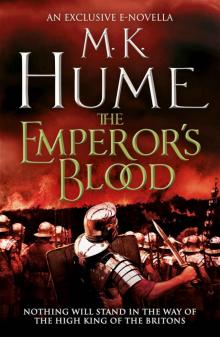 The Emperor's Blood (e-novella)
The Emperor's Blood (e-novella)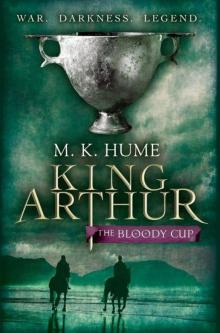 King Arthur: The Bloody Cup: Book Three
King Arthur: The Bloody Cup: Book Three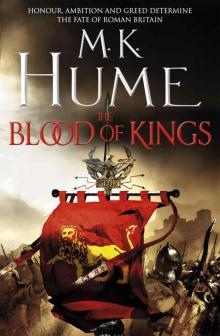 The Blood of Kings: Tintagel Book I
The Blood of Kings: Tintagel Book I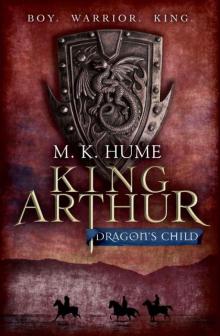 King Arthur: Dragon's Child: Book One (King Arthur Trilogy 1)
King Arthur: Dragon's Child: Book One (King Arthur Trilogy 1)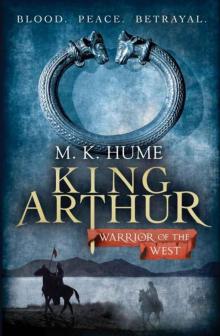 King Arthur: Warrior of the West: Book Two
King Arthur: Warrior of the West: Book Two The Storm Lord
The Storm Lord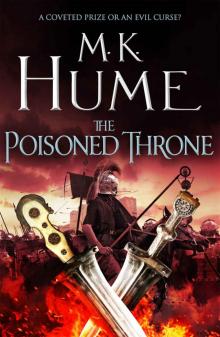 The Poisoned Throne: Tintagel Book II
The Poisoned Throne: Tintagel Book II![M. K. Hume [King Arthur Trilogy 04] The Last Dragon Read online](http://i1.bookreadfree.com/i2/04/07/m_k_hume_king_arthur_trilogy_04_the_last_dragon_preview.jpg) M. K. Hume [King Arthur Trilogy 04] The Last Dragon
M. K. Hume [King Arthur Trilogy 04] The Last Dragon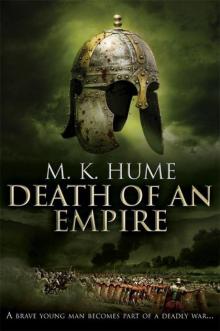 Prophecy: Death of an Empire: Book Two (Prophecy Trilogy)
Prophecy: Death of an Empire: Book Two (Prophecy Trilogy)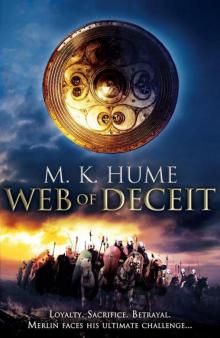 Prophecy: Web of Deceit (Prophecy 3)
Prophecy: Web of Deceit (Prophecy 3)